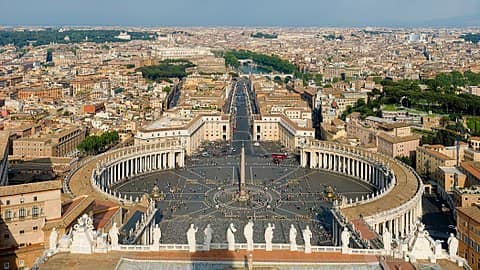Achieving Lebanese Neutrality, with Iran and the Vatican
Elie Aoun/October 14/2020
إيلي عون: تحقيق الحياد اللبناني مع إيران والفاتيكان
ملخص المقالة: بإمكان الفاتيكان وملالي إيران الإتفاق على تحييد لبنان وهذا أمر ممكن على خلفية العلاقة الممتازة بين حاضرة الفاتيكان وجمهورية إيران الإسلامية وفي حال تم الإتفاق على هذا الأمر بين الطرفين لا حاجة عندها ولا ضرورة لموافقة أو رفض الطبقة السياسية في لبنان.
In 2003 when certain lobbying efforts in Washington were directed towards Syria Accountability and Lebanese Sovereignty Restoration Act, I wrote an article advocating Lebanese neutrality. At the time, I perceived the Act as a short-term solution and my neutrality perspective was long-term (to safeguard Lebanon after Syria’s withdrawal).
After the withdrawal of the Syrian occupation army from Lebanon, the major debate became Hizballah’s weapons. At that time, I proposed a certain solution to that issue. Unfortunately, the well-intentioned proposal was on one hand utilized by the FPM leadership in Rabieh to collect monetary “benefits” from Hizballah while the Hizballah leadership used the proposal to drag the issue leading to the instigation of the 2006 war – and the derailment of any solution.
One lesson learned is that it was naïve to consider that the Hizballah leadership had a sense of patriotism or that they wanted solutions. They were given an opportunity to be Lebanese, but they made the free choice to be traitors and con-artists – and they will continue to be treated as such.
All the problems facing Lebanon today are a consequence of failing to resolve pertinent problems and set proper foundations in 2005, after Syria’s withdrawal.
Recently, the Maronite Patriarch Rahi proposed the neutrality option. Although I personally believe that no proposal is currently useful without adequate individuals in position of power, I am willing (as a nationalist) to give the Patriarch’s proposal a chance on the condition that it proves itself to be genuine. How?
When the Patriarch made his proposal, certain politicians opposed it while others took a neutral view or mentioned the need for a Lebanese consensus on neutrality.
In reality, there is no requirement for a Lebanese consensus on neutrality. There is not even a requirement for the approval of a single Lebanese politician.
It is no secret that one primary influencer of Lebanese politics are the clergy of Hizballah, who in turn are influenced by the clergy of Iran, which in turn has the second largest embassy at the Vatican.
So why does the Vatican, which some people consider as a “holy” center, hosts an embassy to an Iranian regime which is considered by many as one of the primary promoter of terrorism in the world today? The answer is certainly not to hold joint prayer meetings. There is, of course, some level of “co-operation” although we do not know what that cooperation might be.
If Patriarch Rahi is sincere about the “neutrality” option, and most likely he is, then all he has to do is to “lobby” the Vatican to adopt that proposal and convince the Iranian clergy to do the same. If the Vatican clergy and Iranian clergy declare Lebanese neutrality, then no Lebanese politician is going to oppose that announcement. They will all rally to support the “historic achievement.” Furthermore, if a certain politician opposes the Vatican-Iranian proposal, what will he do? Force Iran to interfere?
An Iranian declaration of Lebanese neutrality would mean a halt to all direct support to Hizballah – politically, financially and militarily.
In conclusion, the test before Patriarch Rahi is to either convince the Vatican to unilaterally declare Lebanese neutrality, or to convince the Vatican to make a joint Vatican-Iranian announcement in this regard. If either or both of these options are achieved, most politicians or governments will not oppose it – and any opposition would be of no significant value.






















